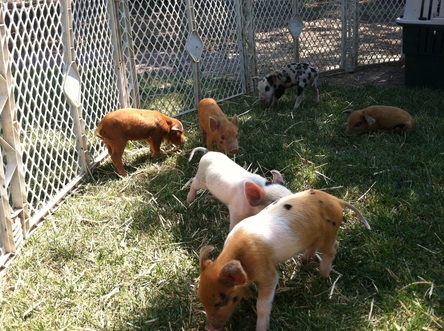
On Monday of this week, food distribution giant, Sysco, announced, "We are committed to working with our pork suppliers to create a gestation crate-free supply system. We’re going to work with our pork suppliers to develop a timeline to achieve this goal.”
Gestation crates are metal cages just big enough to hold a pig and nothing more. Confinement systems are synonomous in factory farms or CAFO's (concentrated animal feeding operations)...Gestation crates disable pigs from moving from side-to-side let alone turn around. Their adorable noses which are intended for rooting around for food are rendered useless stripping them of their "piggyness" (in the words of Joel Salatin).
Sysco is not the first to make this type of pledge but they are the biggest player whose mandate could impact how pigs are raised in the US and hopefully other livestock. It demonstrates the power that corporate responsibility can play. It creates a "keeping up with the Jones" effect. When a industry leader makes a change of this magnitude, others will follow suit in order to be competitive. Likewise, a critical mass of smaller businesses can pressure bigger companies looking to improve their brand image. These motives to improve the lives of pigs and other livestock may not be altruistic but the result is the same...happier animals treated humanely and with respect.
Some staunch hold-outs like Domino's Pizza and Tyson Foods ridicule Sysco on their decision. But just like a politician, their marketing departments may have them singing a different tune if their sales or image starts to drop. Instead of pork, they may be eating crow.
We are already starting to see the impact that a critical mass can have on our food system. Schools and hospitals require huge volumes of food to service their students and clients. They are increasing the demand for healthier, local, sustainably grown food with Farm-to-School initiatives, scratching-cooking programs and Healthy Food in Health Care campaigns.
With Sysco's decision comes easier access for small food businesses looking to improve the food they serve. But this annoucnement does have its pitfalls...it will take 5-10 years to take full effect and "cage-free," like with chickens, does not mean grass-fed or free-range. But its a step in the right direction and one we need to recognize.
Read more on this topic by visiting a more detailed article written by Twilight Greenway at grist.org.

 RSS Feed
RSS Feed
